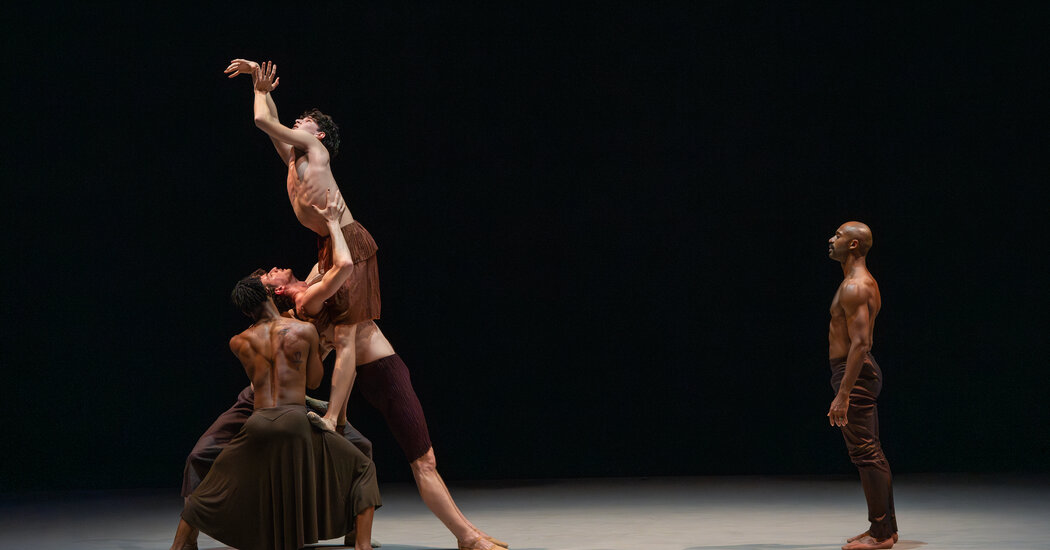“Deep River” is in many ways an apt title for a dance work by Alonzo King. He is a choreographer fixated on flow. The lean, lithe dancers of his San Francisco-based company, Lines Ballet, effortlessly turn and twist and stretch, luxuriating in endless-seeming currents of motion.
For that reason, they can sometimes look drugged, King’s choreography working like an opiate on both them and viewers. In “Deep River,” which had its New York debut at the Rose Theater on Thursday, they might be high on a higher power.
The music has been arranged by the jazz pianist Jason Moran, who plays live along with the vocalist Lisa Fischer. In addition to Moran’s own spare contributions, the score samples from several spiritual traditions — not just the spiritual “Deep River” and the anthem “Lift Every Voice and Sing,” but also a Jewish prayer for the dead composed by Ravel; a devotional song by the 18th-century Bengali singer-poet Kamalakanta Bhattacharya; and compositions by Pharoah Sanders, the great spiritual-jazz saxophonist.
For much of the show, Fischer, a powerhouse vocalist best known as a backup singer, sticks to wordless descant, humming and oohing on top of and around the other music. Moran, at the piano, mainly stirs in quiet musings, as recorded tracks add strings, horns, drones and static. No one, it seems, wants to disturb the meditative flow. At some points, we hear the sound of marching, but in the distance. A composition by Fischer is mostly chimes.
The exceptions to this general lull stick out less as contrast than as anomalies, foreign matter floating in the stream. At the start of one section, the dancers say “yes, yes” and “no, no.” It’s the only time they speak. All through a later duet, the two dancers laugh hysterically for no apparent cause.
Inside King’s choreography, which deftly alternates among ensemble sections, solos and duets, there are small disruptions: sharp angles, spasms, stomping. But these are mere ripples on the surface. The river just keeps rolling along.
All this analysis could be grounds for appreciation. But for me the sameness is numbing. Even when Moran inserts some water-over-rapids speed or a section of clapping titled “Rhythm Chant,” the choreography doesn’t change in attack or tone. Its lack of repetition is ultimately as inducive to tuning out as continuous repetition would be. It’s all swirl, no groove; all water and air, no earth or fire. The world-renouncing attitude drains the dance of gravity and grit.
Most of King’s works are like this, and the sameness is exacerbated by duration and the lack of a contrasting choreographer on the program. There are always the dancers to admire, though. All are wonderful but a few stand out. Babatunji, who gets “Lift Every Voice” to himself, is full of breath. His embodiment of King’s current has some pressure in it, a sense of effort that works as resistance, intensifying the movement and making it clearer. Adji Cissoko, who performs a solo and a series of duets on pointe with Shuaib Elhassan, is breathtaking in her combination of precision and delicacy. She can knock off a chain of perfect pirouettes and then bloom right into the next step, giving King’s run-on sentences more dramatic phrasing.
Cissoko is the heart of the work, really. Early on, she reaches up to the light, collapses and rises again. In her duets with Elhassan, she continually folds over, jackknifed, but then stretches up on her toes, one leg and both arms elongating as much as possible toward the sky. It seems as if she’s yearning to lift off, to leave this world of woe behind, to transcend the illusion of existence — you get the drift.
Alonzo King Lines Ballet
Through Saturday at the Rose Theater, Manhattan; lincolncenter.org.


